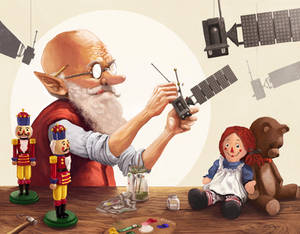
It is a truth universally acknowledged, that a single man in possession of a good fortune, must be in want of a wife.”
—Pride and Prejudice, Jane Austen
The opening line of Jane Austen’s most popular novel, Pride and Prejudice (1813), readily reflects the established view of the early 19th century English gentry and the main theme of every single one of her stories—the pursuit of marriage and through it salvation from spinsterhood and dire financial straits. This was the reality of Austen’s world where being a woman meant having limited options in life. A respectable middle or upper class lady would never have the option of working and had no means of supporting herself outside of the economic institution of marriage.
Without thinking highly either of men or of matrimony, marriage had always been her object; it was the only honourable provision for well-educated young women of small fortune, and however uncertain of giving happiness, must be their pleasantest preservative from want.”
—Pride and Prejudice, Jane Austen
Austen was born on Dec. 16, 1775 in Steventon, England into a large family of eight children. She was the youngest girl. Alongside her sister Cassandra, she was educated at home by her parents, growing with and immersing herself in her father’s library, as well as enjoying comedic plays staged by family and friends. At a time when being a “lady” meant almost universal disapproval of her pursuing a career as a professional writer, Austen was fully encouraged and supported by her family to continue her course towards becoming a published novelist.
A woman, especially, if she have the misfortune of knowing anything, should conceal it as well as she can.”
—Northanger Abbey, Jane Austen
By the age of 23 Austen had already written the first manuscripts for Elinor and Marianne (later to become Sense and Sensibility), First Impressions (now Pride and Prejudice), and Susan (eventually Northanger Abbey) with her father trying but failing to get her initial works published. It was ultimately her brother Henry Austen who successfully secured publication of Sense and Sensibility in 1811. The novel’s emergence and popularity within the fashionable circles of society ensured the future publication of Austen’s work.
Her novels seem to draw from events and situations in her own life. Holding “the mirror up to nature,” Austen used her comedies to reflect the truth in society as she had experienced it. Similar to the theater, society required every lady to play a certain role, one which unfortunately had been assigned to her since the moment of birth. By staying within established social theatrics in her novels, Austen gained the freedom to innocently introduce ladies who rebelled against convention, were confident, spirited, determined, and proved equal in intellect to any man. Her leading ladies raised no objections from readers because to everyone’s satisfaction and approval all the “loose ends” were tied up with her protagonists ending the show properly attired in wedding gowns on their way towards living happily ever after.
I hate to hear you talk about all women as if they were fine ladies instead of rational creatures. None of us want to be in calm waters all our lives.”
—Persuasion, Jane Austen
Over 200 years ago the world read Austen’s first published novel, though no one outside her family (and eventually members of the aristocracy) knew she was the author, as the byline read “By a Lady.” It was not uncommon at the time for female authors to go by other names or, as in this case, even uncredited. Austen’s books continued to be well-received and her earnings provided her some financial freedom, though never sufficient to enjoying a comfortable lifestyle independent of her brother’s support. It was only after her death in 1817 that her brother Henry finally revealed the author’s true identity in the preface to Austen’s final published novel, Persuasion.
Today Austen is one of the most read authors in English literature
Her novels, and even her life story, have been adapted for film (Clueless; Becoming Jane), for television (BBC’s 1995 Pride and Prejudice; Lost in Austen) and most recently re-imagined through today’s technology (The Lizzie Bennet Diaries; Emma Approved), with each production recreating Austen for her current day audience. Even zombies have made their way to Pemberley (in the mash-up parody, Pride and Prejudice and Zombies). From gracing the Bank of England’s £10 note to her latest honor of having Dec. 16 declared worldwide Jane Austen Day by The Jane Austen Centre in Bath, the beloved novelist’s popularity only seems to grow with each generation. Legions of devoted fans, some called Janeites and others Austenites, continue to demand all things Austen, finding in her strong female characters the early echoes of today’s cries for gender equality. It seems the times have finally caught up with Jane Austen, a writer whose words were generations ahead of their time, but always speaking to her readers, especially women, as promises of a more egalitarian society to come.
It is only a novel ... or, in short, only some work in which the greatest powers of the mind are displayed, in which the most thorough knowledge of human nature, the happiest delineation of its varieties, the liveliest effusions of wit and humour, are conveyed to the world in the best-chosen language.”
—Northanger Abbey, Jane Austen
Gallery
Your Thoughts
- When reading an Austen novel (or watching a faithfully-adapted movie version) are you surprised by how contemporary the situations and heartaches her characters faced two centuries ago seem, compared with our own?
- Does it anger or depress you that the life decision conundrums faced by Jane Austen’s female characters 200 years ago are so much unchanged for so many women living today?
- Have you ever felt you had become a Jane Austen character in your own life?
- Which authors today are exploring the same subjects in women’s lives (e.g., marriage vs. career; financial expediency vs. romance) on a similar level of acuity, nuance and wit as Jane Austen?



















































